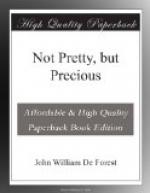The man pushed the door to violently with his foot, and said in an accent of angry scorn, “That is what is now called a wife.”
Well, we have reached the mystery: we have found that it was a crime.
In the working of social laws there occur countless cases of individual hardship. The institution of marriage is as beneficent as the element of fire; yet, like that, it sometimes tortures when it should only have comforted.
The sufferer, if a woman, usually bears her smart tamely—with more or less domestic fretting and private weeping indeed, but without violent effort to escape from her bed of embers. Divorce is public, ugly and brutal: her sensibility revolts from it. Moreover, mere unhappiness, mere disappointment of the affections, does not establish a claim for legal separation. Finally, there is woman’s difficulty of self-maintenance—the fact that her labor will not in general give her both comfort and position.
What then? Unloved, unable to love, yet with an intense desire for affection, and an immense capacity for granting it, her heart is tempted to wander beyond the circle of her duty. A flattering shape approaches her dungeon-walls; a voice calls to her to come forth and be glad, if only for a moment; there seems to be a chance of winning the adoration which has been her whole life’s desire; there is an opportunity of using the emotions which are burning within her. Shall she burst open the gate on which is written LEGALITY?
Evidently the temptation is mighty. Laden with a forsaken, wounded and perhaps angry heart, she is so easily led into the belief that her exceptional suffering gives her a right to exceptional action! She feels herself justified in setting aside law, when law, falsifying its purpose, violating its solemn pledge, brings her misery instead of happiness. She will not, or cannot, reflect that special hardships must occur under all law; that it is the duty of the individual to bear such chance griefs without insurrection against the public conscience; that entire freedom of private judgment would dissolve society.
Too often—though far less often than man does the like—she makes of her sorrow an armor of excuse, and enters into a contest for unwarrantable chances of felicity. Only, in general, she is so far conscious of guilt, or at least so far fearful of punishment, as to carry on her struggle in the darkness. Few, however maddened by suffering, openly defy the serried phalanx of the world. Still fewer venture the additional risk of defying it under the forms of a legality which they have ventured to violate.
Why is it that so few women, even of a low and reckless class, have been bigamists? It is because the feminine soul has a profound respect, a little less than religious veneration, for the institution of marriage; because it instinctively recoils from trampling upon the form which consecrates love; because in very truth it regards the nuptial bond as a sacrament. I believe that the average woman would turn away from bigamy with a deeper shudder than from any other stain of conjugal infidelity.




